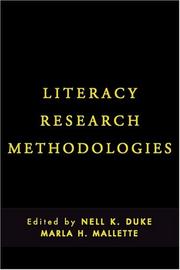| Listing 1 - 4 of 4 |
Sort by
|

ISBN: 1593850603 159385059X Year: 2004 Publisher: New York : Guilford Press,
Abstract | Keywords | Export | Availability | Bookmark
 Loading...
Loading...Choose an application
- Reference Manager
- EndNote
- RefWorks (Direct export to RefWorks)
Balanced and authoritative, this volume brings together leading experts to present 13 methodologies widely used in literacy research. Following a consistent format, each chapter describes the methodology at hand, identifies the types of questions and claims for which it is well suited, delineates clear standards for quality, and presents one or more exemplary studies using the methodology. Guiding readers to choose wisely from available methodologies when designing their own research endeavors--and to understand the contributions that each mode of inquiry can generate--this is an essential text for graduate students in literacy. It is also an ideal resource for more experienced researchers seeking to build their skills for utilizing or evaluating particular approaches.
Pedagogiek en onderwijskunde --. --- Reading --- Research --- Methodology.
Book
ISBN: 9781609181628 160918162X 9781609181635 1609181638 Year: 2011 Publisher: New York : Guilford Press,
Abstract | Keywords | Export | Availability | Bookmark
 Loading...
Loading...Choose an application
- Reference Manager
- EndNote
- RefWorks (Direct export to RefWorks)
"The definitive reference on literacy research methods, this book serves as a key resource for researchers and as a text in graduate-level courses. Distinguished scholars clearly describe established and emerging methodologies, discuss the types of questions and claims for which each is best suited, identify standards of quality, and present exemplary studies that illustrate the approaches at their best. The book demonstrates how each mode of inquiry can yield unique insights into literacy learning and teaching and how the methods can work together to move the field forward." --Publisher description.
Englisch. --- Läsning --- Methodologie. --- Reading --- Reading --- Schreib- und Lesefähigkeit. --- Forskning --- Metodik. --- Research --- Methodology. --- Research --- Methodology.
Book
ISBN: 1462544355 9781462544356 1462544355 Year: 2021 Publisher: New York : The Guilford Press,
Abstract | Keywords | Export | Availability | Bookmark
 Loading...
Loading...Choose an application
- Reference Manager
- EndNote
- RefWorks (Direct export to RefWorks)
Reading --- Research --- Methodology.
Book
ISBN: 1952331099 Year: 2022 Publisher: Washington, District of Columbia : National Association for the Education of Young Children,
Abstract | Keywords | Export | Availability | Bookmark
 Loading...
Loading...Choose an application
- Reference Manager
- EndNote
- RefWorks (Direct export to RefWorks)
Literacy Learning Begins at Birth...and continues throughout our lives! Birth to age 5 is a critical period in building the foundation for later success in reading and writing. Educators play a vital role in nurturing young children’s early language and literacy knowledge and skills. However, the specific practices that support literacy development in early childhood are often different than those used with older children. From some of the foremost early literacy development experts in the field comes this practical resource that is a must-have for all educators of infants, toddlers, and preschoolers. Using eight key practices—Knowing, Showing, Designing, Including, Engaging, Explaining, Observing, and Responding—as the framework, the authors discuss how educators can support five important areas of young children’s early literacy development: Language and knowledge, Print concepts, Sounds and letters, Writing, Text comprehension. A range of features highlights information about these areas and practices, including the latest research findings, recommended resources, tips for integrating technology into play and learning, and more. With this book, explore how to create effective, appropriate, and fun learning opportunities for our littlest literacy learners.
| Listing 1 - 4 of 4 |
Sort by
|

 Search
Search Feedback
Feedback About UniCat
About UniCat  Help
Help News
News